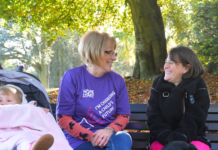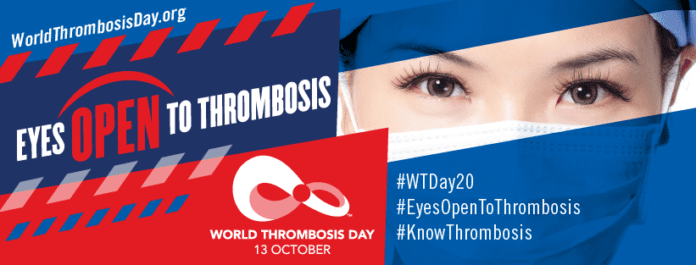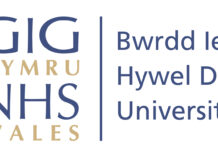Mae Bwrdd Iechyd Prifysgol Hywel Dda yn cefnogi ymgyrch ryngwladol i helpu i atal cleifion rhag cael eu heffeithio gan geuladau gwaed tra yn yr ysbyty.
I nodi Diwrnod Thrombosis y Byd, mae’r bwrdd iechyd yn cyflwyno cyfres o adnoddau wedi’u diweddaru ar gyfer staff clinigol i helpu i atal thrombosis gwythiennau dwfn ac embolws ysgyfeiniol mewn cleifion Covid a rhai nad ydynt yn Covid.
Mae cleifion yn cael eu hannog i chwarae eu rhan hefyd trwy ddysgu adnabod arwyddion a symptomau ceulad gwaed, ynghanol ymchwil sy’n awgrymu bod rhywun mewn mwy o berygl o ddatblygu’r cyflwr wrth gael triniaeth am salwch difrifol yn yr ysbyty.
Thrombosis gwythiennol (VTE) yw ffurfio ceulad y tu mewn i biben waed, fel arfer yn y coesau, sy’n cyfyngu ar lif y gwaed ac a all ddod yn angheuol os yw’n torri i ffwrdd ac yn mynd i mewn i’r ysgyfaint.
Er y gall unrhyw un ddatblygu ceulad, mae tystiolaeth wyddonol ddiweddar yn awgrymu y gallai pobl sy’n cael eu derbyn i’r ysbyty gyda Covid-19 fod mewn perygl arbennig oherwydd tueddiad y ‘firws’ i achosi tewychu’r gwaed mewn cleifion. O’r herwydd, mae’r bwrdd iechyd yn cyfarwyddo ei staff clinigol i lenwi gwahanol ffurflenni asesu risg ar gyfer cleifion yn dibynnu a oes ganddynt y firws ai peidio.
Dywedodd Dr Saran Nicholas, Haemotolegydd Ymgynghorol ym Mwrdd Iechyd Prifysgol Hywel Dda: “Mae’n hanfodol bod pob claf dros 16 oed yn cael ei asesu risg ar gyfer VTE.
“Mae tua 60 y cant o VTE yn flynyddol yn gysylltiedig â mynediad i’r ysbyty. Nod yr adnoddau rydyn ni’n eu cyflwyno i’n staff yw ei gwneud hi’n haws asesu risg cleifion a sicrhau bod naill ai thromboprophylacsis mecanyddol a / neu ffarmacolegol yn cael ei ragnodi. ”
Ychwanegodd Dr Phil Kloer, Cyfarwyddwr Meddygol Hywel Dda: “Rydym yn codi proffil Diwrnod Thrombosis y Byd; Mae thrombosis yn fater mor bwysig ac mae ganddo ganlyniadau cwbl ddinistriol os yw wedi ei fethu, felly rwy’n annog yr holl staff i sicrhau eu bod yn ymwybodol o’r adnoddau asesu risg newydd ac i sicrhau eu bod yn cael eu cwblhau.”
———————————————————————————
Hywel Dda University Health Board is supporting an international campaign to help prevent patients from being affected by blood clots while in hospital.
To mark World Thrombosis Day, the health board is rolling out a suite of updated resources for clinical staff to help prevent deep vein thrombosis and pulmonary embolus in both Covid and non-Covid patients.
And patients are being urged to play their part too by learning to recognise the signs and symptoms of a blood clot, amid research which suggests that a person is more at risk of developing the condition when being treated for a serious illness in hospital.
Venous thrombosis is the formation of a clot inside a blood vessel, usually in the legs, which restricts blood flow and can become fatal if it breaks off and enters the lungs.
Although anyone can develop a clot, recent scientific evidence suggests that people who catch Covid-19 may be particularly at risk due to the virus’ propensity to cause thickening of the blood in patients. As such the health board is directing its clinical staff to complete different risk assessment forms for patients depending on whether or not they have the virus.
Dr Saran Nicholas, Consultant Haemotologist at Hywel Dda University Health Board, said: “It’s essential that all patients over the age of 16 are risk assessed for VTE.
“Around 60 per cent of VTE annually are associated with an admission to hospital. The resources that we are rolling out for our staff are aimed at making it easier to risk assess patients and ensure that either mechanical and / or pharmacological thromboprophylaxis is prescribed.”
Dr Phil Kloer, Medical Director at Hywel Dda, added: “We are raising the profile of World Thrombosis Day; Thrombosis is such an important issue and has absolutely devastating consequences if it’s missed, so I am urging all staff to ensure they are aware of the new risk assessment tools and to ensure that they are completed.”
Help keep news FREE for our readers
Supporting your local community newspaper/online news outlet is crucial now more than ever. If you believe in independent journalism, then consider making a valuable contribution by making a one-time or monthly donation. We operate in rural areas where providing unbiased news can be challenging. Read More About Supporting The West Wales Chronicle























